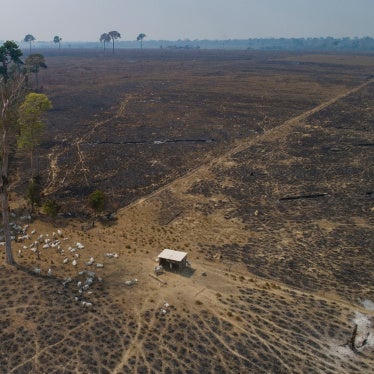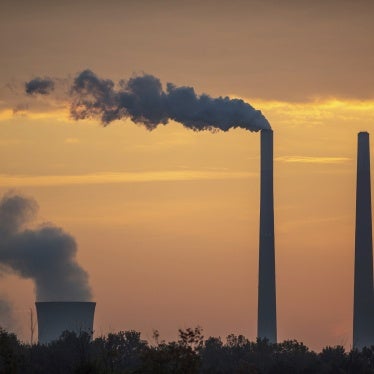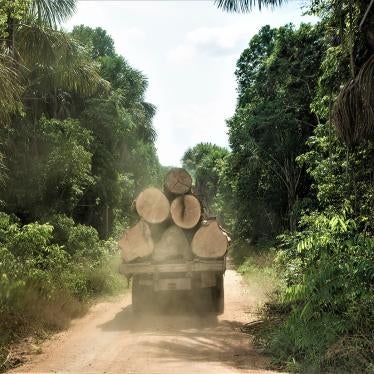Dear Foreign Ministers and Members of the European Parliament:
We are writing to share our concerns regarding the environmental and human rights crisis unfolding in the Brazilian Amazon, and to urge that the EU-Mercosur trade agreement not be considered for ratification until Brazil demonstrates its readiness to meet its commitment to preserve the rainforest and uphold its duty to protect the people who live there. We believe the European Union should establish concrete benchmarks with which to assess if and when Brazil is ready to meet these obligations.
The trade deal, agreed to in principle last year, includes provisions that commit all the parties to uphold the Paris climate agreement and to fight deforestation. In the case of Brazil, these commitments are one and the same: under the Paris agreement, Brazil has committed to eliminating illegal deforestation by 2030. Yet the current policies of President Jair Bolsonaro are in direct conflict with these commitments and have compounded the crisis in the Amazon, resulting in more illegal deforestation, not less.
Brazil was once a global leader in forest conservation. Between 2004 and 2012, a concerted effort by the government and Brazilians of many backgrounds—including Indigenous communities, environmental groups, and private enterprise—produced an 80 percent decrease in deforestation in the Amazon. But after 2012, budget cuts and policy missteps weakened Brazil’s environmental enforcement agencies, and deforestation rebounded.
This rebound has been driven largely by violent criminal networks from whom the government has abjectly failed to protect Brazilians, as is its duty. A 2019 Human Rights Watch report documented how these mafias threaten, attack, and kill environmental enforcement agents, members of Indigenous communities, and other local residents who seek to protect the rainforest. The killers are rarely brought to justice. Until Brazil makes progress curbing the violence and impunity affecting its forest defenders, the destruction of the Amazon is likely to continue unchecked.
Since taking office in January 2019, President Bolsonaro has effectively sided with the mafias. As documented by Human Rights Watch, his administration has sabotaged Brazil’s already weakened environmental and Indigenous protection agencies and sought to sideline the country’s environmental groups. It is no surprise that deforestation rose by more than 80 percent last year—according to data based on real-time alerts by Brazil's Space Research Agency—and continues to increase this year. Nor is it a surprise that threats against forest defenders have also increased.
The European Union has ample reason to support the many Brazilians who are seeking to uphold the laws that protect the country’s rainforest. Scientists say that unchecked deforestation is speeding the Amazon toward an irreversible “tipping point,” where it will stop serving as a natural storage area for carbon dioxide, a key driver of climate change, and instead release massive amounts of greenhouse gases. The result will compound the climate crisis that threatens Europeans and Brazilians alike. Moreover, the European Green Deal commits the EU to ensuring that its trade policy reduces deforestation in its supply chains and contributes to global efforts to curb climate change.
There has been considerable debate over whether the EU-Mercosur agreement can do much to advance these goals of the Green Deal, especially given that its environmental provisions do not establish sanctions for non-compliance. What is clear, however, is that Bolsonaro is already dismantling Brazil’s capacity to comply with them—and hastening that “tipping point,” where compliance could become impossible. If the EU is to uphold its own environmental commitments and support the Brazilians who are struggling to save their rainforest, the time to act it now, before Bolsonaro can do potentially irreparable harm.
The EU, the European parliament and EU member states should send a clear and categorical message to President Bolsonaro that ratification of the trade agreement will not be considered until Brazil’s government shows it is ready to comply with the agreement’s environmental provisions. To assess this readiness, the EU should establish clear and verifiable benchmarks based on concrete actions and results, not plans or proposals. These benchmarks should address the interrelated problems at the heart of the crisis: violence and deforestation.
Specifically, ratification of the EU-Mercosur trade agreement should not be considered until Brazil has demonstrated:
- Progress in ending impunity for violence linked to illegal deforestation, as measured by the number of these cases investigated, prosecuted, and brought to trial;[1] and
- Progress in reducing rates of deforestation in the Amazon sufficient to put the country on track to meet its target under the Paris Agreement of eliminating all illegal deforestation by 2030.[2]
In addition, the European Union should closely monitor policies and legislative initiatives promoted by the Brazilian government that could encourage illegal invasions of Indigenous territories or otherwise undermine protections of the Amazon rainforest and the rights of the people who live there.
If the EU-Mercosur agreement is ratified without the Brazilian government demonstrating real progress in addressing the Amazon crisis, it will undercut the credibility of the European Union’s own commitment to climate-safe trade under the Green Deal.
Sincerely,
Lotte Leicht
EU Advocacy Director
Maria Laura Canineu
Brazil Director
Daniel Wilkinson
Environment and Human Rights Director
CC:
President of the European Commission, Ms Ursula von der Leyen
High Representative for Foreign Affairs / Vice-President of the European Commission, Mr Josep Borrell
EU Commissioner for Trade, Mr Phil Hogan
Head of the EU Delegation to Brazil, Amb. Ignacio Ybáñez
Committee of the Permanent Representatives of the Governments of the Member States to the European Union (COREPER II)
[1] Given the lack of official information regarding violence against forest defenders in the Brazilian Amazon, a baseline for determining progress in ending impunity should be the figures provided by the Pastoral Land Commission (CPT), a nongovernmental organization affiliated with the Catholic Church. The CPT has registered more than 200 killings between 2015 and 2019 in the context of conflicts over the use of land and resources in the Amazon — many of them by people involved in illegal deforestation — of which only 8 have gone to trial.
[2] Any effort to meet this target by relaxing the definition of illegal deforestation as it currently stands should be considered a breach of this commitment.








